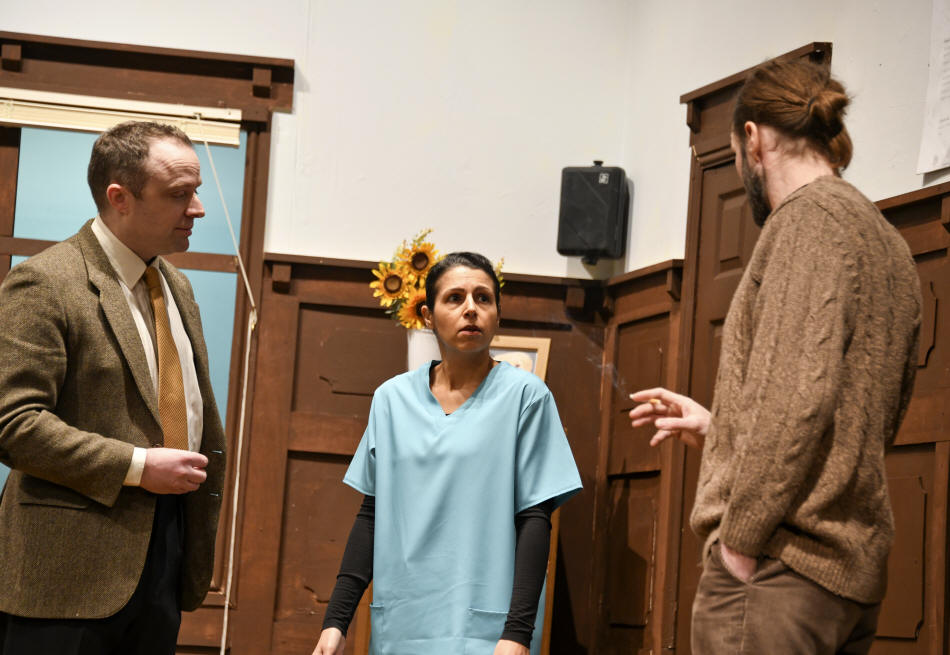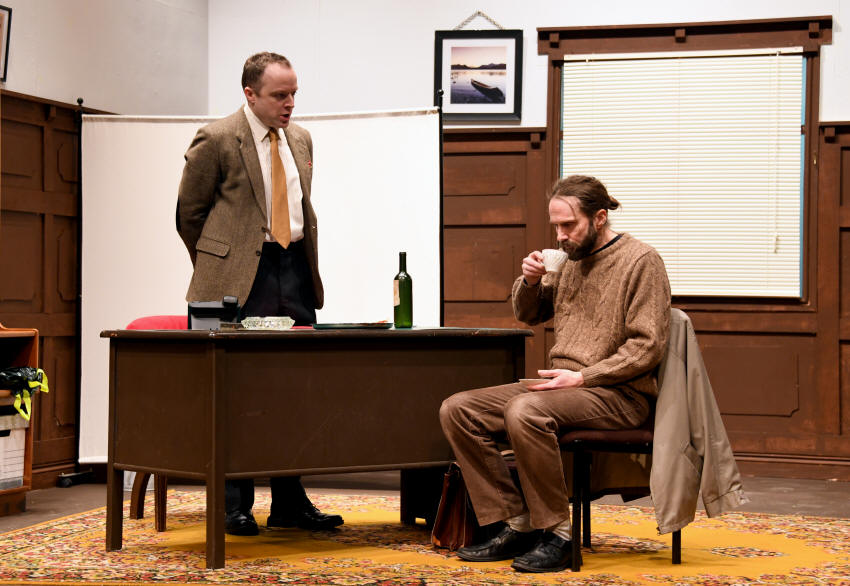
Stuart Wishart as
Farquhar, Bhupinder Brown as Paisley and Styler played
by Joseph Harper
Mindgame
The Nonentities
The Rose Theatre, Kidderminster
*****
We have a morbid fascination with what
we classify as the criminally insane, it’s what sells the likes of
Psycho, Silence of the Lambs
and The Night of the Hunter.
It’s a fascination for Mark Styler, a writer of
sensational true crime books about serial killers, and it is what has
brought him to Fairfields, a secure hospital for those the courts deem
as being in need of treatment, perhaps even for life, rather than simply
a spell in prison.
Styler wants to interview a patient there,
Easterman, a notorious killer who had a penchant for eating bits of his
many victims, particularly the liver, as well a burying other bits in
his garden.
As we open Styler, who has been sitting on stage
as the audience enter, is mad, that’s angry mad, not mad mad,
incidentally, having been kept waiting two hours for the hospital
director, Dr Farquher (with a silent q and h if you are interested) who
finally arrives apologising that he has had to deal with an emergency in
B wing – a hint there that the secure hospital has a prison regime.
The initial meeting does not go well. Farquer’s
secretary is away and he has no idea who Styler is or what he wants and,
with no interest in seeing him, tries to get him to leave, calling in
Nurse Paisley to take him to the kitchen for a cup of tea then see him
out.
Styler persists though and sets in train a game
of mental ping pong between doctor and writer with the nurse becoming an
unwitting victim in a psychological thriller with twists at every turn.
Joseph Harper goes through the whole gamut of
emotions as Styler from his early frustration and mild anger, his
annoyance at not only being told he couldn’t see Easterman but that
Farquher claimed to know nothing about signing the letter inviting him
down to Fairfields.

Hospital director Farquhar with writer Styler
Styler is going to experience exasperation fear
and despair - as well as a straight jacket - as the meeting goes on. It
is a tremendous performance.
That is matched by Stuart Wishart’s assured
Farquhar, who puts Styler, and indeed the packed audience off balance by
seemingly not knowing where anything is in his own desk, having to rely
on Nurse Paisley to find anything. The doctor poses questions which
throw Styler off balance and at times shows a manner we would perhaps
struggle to describe as bedside. He sees himself as possessing an
intellectual superiority adding psychological bullying to his armoury in
a remarkable performance.
Bhupinder Brown shows a strange mix of fear and
control as Nurse Paisley. There is an obvious fear of Farquhar, who
shows flashes of barely controlled temper, yet at times she seems in
charge, with Farquhar meekly following her instruction to find the most
mundane of objects in his desk, - a lighter, an ash tray . . .. It’s a
lovely performance to contrast to the rutting stag game being played by
Styler and Farquhar.
Director Tori Wishart and her excellent cast
build the tension slowly, layer by layer. As times goes on we start to
realise all is not as is should be but putting a finger on it is not
easy and just when you have it all figured out, the rules of the game
change and you on the back foot again.
Not that it is all tension, there are plenty of,
at times uneasy, laughs with Wishart a master of black humour, throwing
in beautifully timed asides and one liners.
Then there is the sound from David Wakeman – who
also designed the lighting which come into its own at the dramatic end.
The hospital has a Swedish sound system which
apparently cannot be turned off which seems to play Acker Bilk’s
Stranger on the Shore constantly . . . in snatches. A few bars,
silence for a while, then a few more bars. Again, a device which helps
to make an audience uneasy as music keeps appearing and vanishing in the
background.
The set from the construction team under Keith
Higgins gives us an authentic office but with a couple of telling
variations which are cleverly done to put us off balance even more.
There are times when the only difference between
amateur and professional theatre is whether the actors get paid and as
productions go this would not look out of place on any professional
stage.
Anthony Horowitz’s script is clever, witty and
has a strange logic by the end, but it is difficult to review as detail
is a spoiler in itself. Suffice to say it is well paced, wonderfully
acted and a play that question sanity and leaves you intrigued, if a
little uneasy, from its quiet beginning to dramatic end. Simply superb
theatre.. To 03-02-24.
Roger Clarke
29-01-24
|

